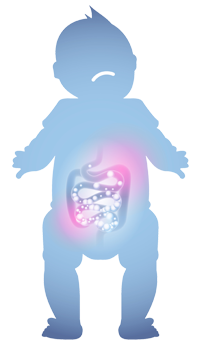Free Case Evaluation
You will never be charged a fee unless a recovery is made for you.
Necrotizing enterocolitis (NEC) is a very serious illness that most commonly occurs in the intestines of preterm babies.
Necrotizing = damage and death of cells
Entero = referring to the intestine
Colitis = inflammation of the lower part of the intestines (colon)
NEC may lead to serious health problems and complications, including:
Necrotizing enterocolitis may even lead to death.

With necrotizing enterocolitis, the tissues of the intestine are weakened by decreased blood flow or oxygen. These weakened areas can become damaged by bacteria in the food the baby was fed—sometimes becoming severely damaged and possibly dying. This severe tissue damage and death can lead to a perforation (hole) in the intestine through which bacteria—bacteria not intended to be outside of the intestinal tract—can pass into the baby’s abdomen, causing a severe abdominal infection. This can progress very rapidly and be overwhelming to the baby.
Symptoms of necrotizing enterocolitis can vary from baby to baby, and some of those symptoms may seem like signs of other, more common digestive problems.
Signs that a baby could have necrotizing enterocolitis include:
There is no single factor that consistently causes premature babies to develop necrotizing enterocolitis. Instead, many factors can contribute to premature babies developing necrotizing enterocolitis, including:
The link between feeding preterm babies cow’s milk and necrotizing enterocolitis has been known to science and the industry for years. But the makers of Enfamil and Similac baby formula and fortifiers did not place a warning on their products. This failure to warn has parents filing lawsuits.
One study of more than 900 premature infants found that:
When a preterm infant shows signs of necrotizing enterocolitis, the diagnosis can be confirmed by x-ray. Doctors can identify NEC by the look of the intestine. In advanced or severe cases of necrotizing enterocolitis, air may escape from the intestine and show up in the large veins of the abdominal cavity or liver. Also, the doctor may insert a needle into the baby’s belly to withdraw fluid to determine if there is a hole in the intestine (checking for waste or bacteria).
Treatment for necrotizing enterocolitis includes:
The doctors will examine the baby often, and there will be frequent abdominal x-rays. A pediatric surgeon may be brought in to determine whether surgery is needed. The baby’s stool (poop) will be examined for blood and the baby’s tummy checked for swelling. The baby may need extra oxygen or a ventilator. They will also test the blood frequently to check for bacteria and for anemia.
Sources
Berkhout, D.J.D., et al. (2018, September). Risk Factors for Necrotizing Enterocolitis: A Prospective Multicenter Case-Control Study. Retrieved from https://www.karger.com/Article/Fulltext/489677
Boston Children’s Hospital. (n.d.). Necrotizing Enterocolitis. Retrieved from https://www.childrenshospital.org/conditions-and-treatments/conditions/n/necrotizing-enterocolitis
Children’s Hospital Los Angeles. (n.d.). Necrotizing Enterocolitis. Retrieved from https://www.chla.org/necrotizing-enterocolitis
Children’s Hospital of Philadelphia. (n.d.) Necrotizing Enterocolitis. Retrieved from https://www.chop.edu/conditions-diseases/necrotizing-enterocolitis
Children’s Hospital of Pittsburgh. (n.d.). Necrotizing Enterocolitis Symptoms and Treatment. Retrieved from https://www.chp.edu/our-services/transplant/liver/education/liver-disease-states/necrotizing-enterocolitis
Chokshi, N., et al. (2008, April). The Role of Nitric Oxide in Intestinal Epithelial Injury and Restitution in Neonatal Necrotizing Enterocolitis. Retrieved from https://www.sciencedirect.com/science/article/abs/pii/S0146000508000037
Cleveland Clinic. (2021, May 18). Necrotizing Enterocolitis (NEC). Retrieved from https://my.clevelandclinic.org/health/diseases/10026-necrotizing-enterocolitis#:~:text=Necrotizing%20enterocolitis%20(NEC)%20is%20a,or%20bloodstream%20through%20the%20hole
Colaizy, T. (2016, August). Impact of Optimized Breastfeeding on the Costs of Necrotizing Enterocolitis in Extremely Low Birthweight Infants. Retrieved from https://pubmed.ncbi.nlm.nih.gov/27131403/
Eidelman, A., and R. Schanler. (2012, March). Breastfeeding and the Use of Human Milk. Retrieved from https://pediatrics.aappublications.org/content/129/3/e827
Gephart, S. (2012, April). Necrotizing Enterocolitis Risk. Retrieved from https://www.ncbi.nlm.nih.gov/pmc/articles/PMC3357630/
Hunter, C., et al. (2008, February). Understanding the susceptibility of the premature infant to necrotizing enterocolitis (NEC). Retrieved from https://pubmed.ncbi.nlm.nih.gov/18091350/
Johns Hopkins Medical Institutions. (2011, May 1). Formula-fed preemies at higher risk for dangerous GI condition than babies who get donor milk. Retrieved from https://www.sciencedaily.com/releases/2011/04/110430171122.htm
Kids Health. (2011). Necrotizing enterocolitis. Retrieved from https://kidshealth.org/parent/medical/digestive/nec.html
Lucas, A., and T. J. Cole. (1990, December). Breast milk and neonatal necrotising enterocolitis. Retrieved from https://pubmed.ncbi.nlm.nih.gov/1979363/
Minekawa, R., et al. (2004, June 30). Human breast milk suppresses the transcriptional regulation of IL-1beta-induced NF-kappaB signaling in human intestinal cells. Retrieved from https://pubmed.ncbi.nlm.nih.gov/15229109/
Ochoa, T., et al. (2020). Is Mother’s Own Milk Lactoferrin Intake Associated with Reduced Neonatal Sepsis, Necrotizing Enterocolitis, and Death? Retrieved from https://read.qxmd.com/read/32053823/is-mother-s-own-milk-lactoferrin-intake-associated-with-reduced-neonatal-sepsis-necrotizing-enterocolitis-and-death
Shulhan, J., et al. (2017, January 11). Current Knowledge of Necrotizing Enterocolitis in Preterm Infants and the Impact of Different Types of Enteral Nutrition Products. Retrieved from https://www.ncbi.nlm.nih.gov/pmc/articles/PMC5227976/
Stanford Children’s Health. (n.d.). Necrotizing Enterocolitis in the Newborn. Retrieved from https://www.stanfordchildrens.org/en/topic/default?id=necrotizing-enterocolitis-90-P02388
University of Missouri-Columbia. (2020, August 12). Human milk based fortifiers improve health outcomes for the smallest premature babies: Researchers compare traditional cows milk based fortifiers with human milk based alternative Retrieved from https://www.sciencedaily.com/releases/2020/08/200812153642.htm
UPMC, Children’s Hospital of Pittsburgh. (n.d.). Necrotizing Enterocolitis (NEC). Retrieved from https://www.chp.edu/our-services/transplant/intestine/education/intestine-disease-states/necrotizing-entercolitis
U.S. National Library of Medicine, Medline Plus. (n.d.). Neonatal weight gain and nutrition. Retrieved from https://medlineplus.gov/ency/article/007302.htm
WebMD. (2020, October 14). What Is Necrotizing Enterocolitis? Retrieved from https://www.webmd.com/parenting/baby/what-is-necrotizing-enterocolitis#1
You will never be charged a fee unless a recovery is made for you.